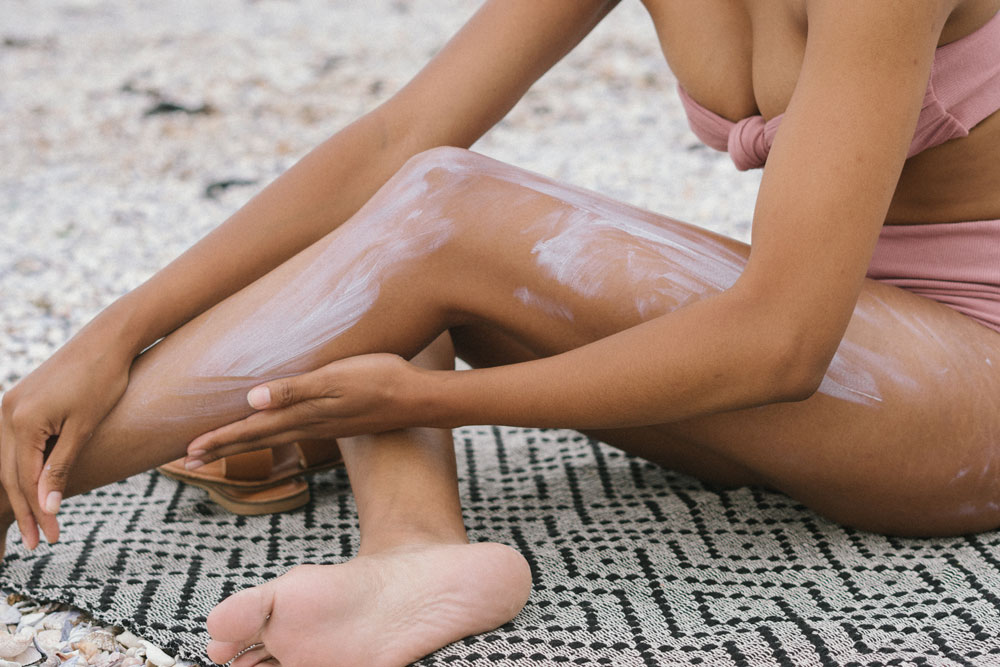
Wearing sunscreen is not just for beach vacations or the summertime, it’s for every day the sun shines, even when it’s cloudy.
Many of my clients ask me about the best anti-aging products for them, and often when I suggest that SPF is the best and most effective anti-aging product in your daily regimen, I can tell they don’t believe me off the bat. Then I tell them this…
Here’s why SPF is necessary for every day for every skin type and skin tone.
SPF Science:
The sun’s UVA and UVB rays are always shining down and reaching where you stand.
UV(A) rays are the “Aging” rays, and unfortunately, they are always beaming down, rain shine, and yes, even when it’s cloudy. These rays penetrate deeply into the skin.
UV(B) rays are the rays that “Burn” you. (See what I did there? Some basic Alphabetics to help you remember.) You might feel them more in the summer, on a Caribbean vacation, or a long hike.
But (and this is a BIG BUT) even if you don’t feel the sun on your skin, UV rays are still present and wearing away the Collagen and Elastin in your skin’s cells, especially that scary UVAging rays. This UV exposure is what causes fine lines and wrinkles and puts you at risk of sun damage and even scarier, skin cancer.
You want to look for a broad-spectrum sunscreen which means it will cover you against both UVA and UVB rays.
SPF stands for SUN PROTECTION FACTOR.
In basic terms, if you are using an SPF 30, your skin is protected for 30x longer (than the normal time it takes you to burn) then when you have no sunscreen on.
Wearing a minimum of SPF 30 is recommended as the lower level SPF’s do not block enough UV rays. It’s super important to re-apply sunscreen throughout the day especially when doing outdoor activities, because it’s very likely you will sweat or it will wear off as you go throughout your day (especially if it’s a mineral, aka “physical” sunscreen because that sits on the surface of the skin.)
How much sunscreen should I put on?
Think of a cap to a beer bottle, then think of filing half of that cap with sunscreen. That is the amount needed (at minimum) for your face, neck, and ears.
Applying it carefully is a must, and to make sure you’ve covered everything, you can benefit from applying two layers.
Choosing a liquid or cream sunscreen instead of a spray or powder will help in getting a more solid coverage. SPF sprays and powders, as well as foundations with sunscreen, are great for added coverage or touchups, but not enough coverage for your base application.
Mineral vs. Chemical Sunscreens
Mineral aka Physical sunscreens are the ones that are thick, often super white, and are full of, well…minerals. They sit on the surface of the skin and create a “physical” barrier between you and the sun.
Common active minerals are Zinc Oxide and Titanium dioxide. Both are, in their organic makeup, broad-spectrum and protect against both UV rays. They are great for very fair skins that burn quickly and are often found in baby sunscreens.
Chemical sunscreens penetrate into the surface of the skin instead of sitting on top which can make them more durable when exposed to sweat or water.
Chemical sunscreens usually have active ingredients that end in an “-ate” or “-one” like Avobenzone and Octinoxate. Chemical sunscreens are not always broad-spectrum, so it’s important to look for ones that say that they are. They are usually preferred by folks with medium to dark skin tones, because they don’t leave a white cast on the skin, and also by those who dislike the texture or heaviness of a mineral sunscreen.
So, you’re saying I should wear sunscreen, huh?
Yes! The best way to protect your skin from aging & spending lots of money on lasers & fillers is by wearing an SPF daily.
This will make sure that you are treating you and your skin optimally, and will yield great results even if you feel that you jumping on the bandwagon a little late. (You’re not.)
Often, a followup question I get from my clients once I tell them this is, “Ok, then if I need sunscreen every day, which one do I use? I don’t want to break out or feel greasy!”
Don’t worry. I got you.
Check out my Sunscreen Guide here: Sunscreen: Which One is Best for Me?
xoxo,
Brielle